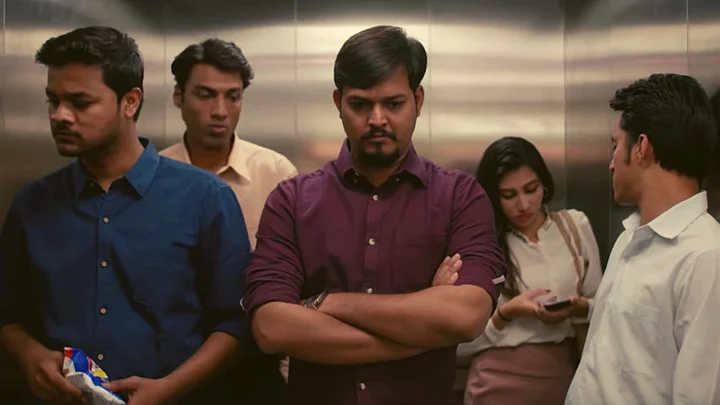It was October last year. It was the first week of the month, when Tanushree Dutta came out with her story. Suddenly, there was a storm of stories that flooded news headlines and social media – stories of women from the entertainment, media and other industries, who made shocking revelations about their experiences.
It intrigued me; I went through each and every case and article. That was the beginning of my short film (link below):
How a Conversation in a Lift Sparked a Film
I was working in an office in Ahmedabad at that time. I remember taking the lift – after a ‘paan shop break’ with three colleagues – to go back to office on the 10th floor. We were talking about an affair, and office politics at our workplace, as well as stories from our earlier workplaces.
We were all joking around – when the lift door opened at the basement and there was a woman standing in front of us.
The four of us went quiet and stopped talking about office affairs. When we reached our floor, however, we instinctively resumed our earlier conversation. Harshil (the co-writer of this video) and I voiced aloud what we were both thinking – “What if there were some guys who didn’t keep quiet/change the topic in front of an unknown woman?”
The whole situation had kind of pinched me into introspection. I thought about how boys/men/male colleagues often talk about the shenanigans of co-workers/superiors. I thought to myself – how easily we talk about others disrespectfully (often about women) and say sexist things. I thought of the many men I had come across – many of them friends – who often displayed chauvinistic attitudes.
I couldn’t stop thinking about it. I told Harshil that very day that there needed to be a short film around this subject.
That was the conversation that led to this film. I began to think cinematically.
The one-line idea was simple: if some chaps got into an argument about sexual misconduct in a workplace and started saying sexist things – and then, suddenly, the lights went off, what would the sole woman in the lift think?
#MeToo in Offices
Cut To: MAMI Film Festival in Mumbai, the last week of October.
One evening, after watching a film called Searching for Ingmar Bergman, I was so inspired that I raced across to a cafe nearby to finish the draft of the short film in one sitting. After the festival ended, Harshil and I stayed back for two days to finish the second draft of the short. When we returned to Ahmedabad, we talked to our friends about it and asked them – particularly the women – for their opinions.
The reception was mixed. While some said, “boys don’t behave that way!”, others said, “the men in this film disgust me as I have also encountered something similar”. Harshil and I rewrote our script, based on the opinions – and this seventh draft became our final shooting script.
While making the film too, I was open to how the actors would emote. I asked them to think about how they would react if something like this happened.
In the media too, we watched how several artistes and dignitaries commented on the movement – many of these statements were contradictory to each other. That reality was precisely what I wanted to present in my film – characters having contradictory thoughts. For instance, one of the most powerful stories was about the woman in the short film. She would watch news on the #MeToo movement on the office TV every day, but what she witnesses in the lift triggers her to switch off the television in frustration. Suddenly, it has become more real for her – listening to the man in the lift voicing his opinion on women sharing their #MeToo stories.
That was what I wanted to capture in the film.
(Mohit Chandnani is an Assistant Director, working in films and TV shows. He has a Bachelors degree in Business Administration and hails from the city of Ahmedabad. Mohit is an aspiring filmmaker.)
(At The Quint, we question everything. Play an active role in shaping our journalism by becoming a member today.)
